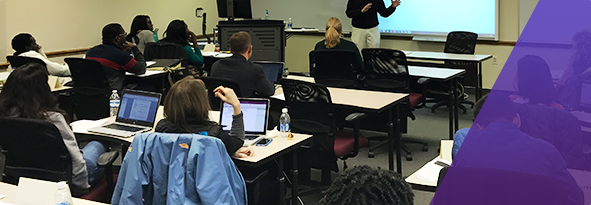Business Analytics
Overview:
The specialization in Business Analytics, most importantly, provides students the skills to analyze, understand, and interpret data. Based on statistical methods, business analytics searches for new insights and patterns in the data to improve organizational performance. The specialization is designed to equip students with business analytics and intelligence (BI) skills, which is a broad category of analytical techniques, technologies, and applications for accessing, and analyzing data to help users make better business decisions.
Who Will Benefit From This Program:
According to the U.S. Bureau of Labor Statistics, business-analyst jobs are predicted to increase by 22 percent by 2020. If you’re a student seeking a high-paying job with great opportunities in one of the fastest growing industries, the Business Analytics specialization will prove to be beneficial. This specialization is also ideal for student who want to gain insight to conducting basic and advanced statistical and quantitative analysis, develop predictive models using popular software tools such as SAS Enterprise Guide, SAS Enterprise Miner, and spreadsheets.
Courses & Structure:
REQUIRED COURSES – All 3 Courses Are Required:
- MBA 545 – BUSINESS INTELLIGENCE AND DATA ANALYTICS – In today’s competitive environment it has become imperative for business to analyze, understand, and interpret Big Data. This course is designed for those who want to equip themselves with business analytical and intelligence (BI) skills, which is a broad category of analytical techniques, technologies, and applications for gathering, storing, accessing, and analyzing data to help users make better business decisions. Business Intelligence requires foundation knowledge of data storage and retrieval. For this, the course also covers fundamentals of database management in terms of data modeling, the entity-relationship model, and Structured Query Language (SQL). The course will also address ethical issues and considerations in management of data. Although several commercial and open-source tools used for data analytics will be examined, the primary concepts will be illustrated using SAS Enterprise Miner. Prerequisites: None
- MBA 546 – BUSINESS ANALYTICS 1 – Business Analytics 1 teaches the basic skills, applications, and practices necessary for continuous exploration and investigation of organizational data. Based on statistical methods, business analytics searches for new insights and understanding of organizational performance. Business Analytics 1 presents the logical process of conducting a statistical analytics project. Topic coverage includes descriptive and inferential statistics. Students are encouraged to analyze data related to their job. Prerequisites: None
- MBA 548 – ANALYTICAL MODELING FOR DECISION-MAKING – Analytical modeling is the important tool used in business analytics to improve an organization’s ability to enact rational and meaningful management decisions. This class will expose students to the use of optimization and simulation models to assist in decision-making in a variety of business applications, including production, logistics, marketing, accounting and finance. Topics covered include linear/nonlinear optimization, simulation, and decision analysis. A strong emphasis on case studies and experiential learning will be used throughout the course, in order to give students practical experience with the tools. Students will develop and apply optimization and simulation models using Microsoft Excel and Excel’s add-in, Solver. Prerequisites: MBA 546 or MBA 500H
COURSE OFFERING SCHEDULE:
- MBA 545 – BUSINESS INTELLIGENCE AND DATA ANALYTICS – one section each – fall, spring, summer
- MBA 546 – BUSINESS ANALYTICS 1 – one section each – fall, spring, summer
- MBA 548 – ANALYTICAL MODELING FOR DECISION-MAKING – one section each – spring


